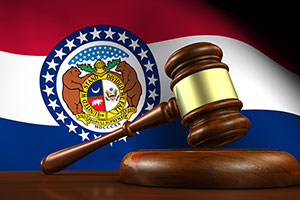To large corporations, insurance companies, and their lobbyists, Missouri is a “judicial hellhole.” To consumers and injury victims, Missouri is a state where business lobbyists have not made it impossible for them to win fair compensation when they are harmed by corporate wrongdoing. Both perspectives are poised to change.
Corporate lobbyists have been fierce advocates for the Daubert rule, which (from their perspective, at least) restricts the admissibility of expert testimony, potentially making it more difficult for plaintiffs to win cases. They realized their dream with the election of Eric Greitens as governor. One of the legislature’s first agenda items was to pass a Daubert bill. Gov. Grietens signed the bill into law in March.
According to Gov. Grietens, Missouri’s adherence to the Frye standard allowed “trial lawyers to come to Missouri, pick our pockets, and hurt our businesses.” The governor cited no example of a verdict against a business that was undeserved. He also failed to identify any “crooked trial lawyers” or “shady witnesses” who affected the outcome of a Missouri trial, although he derided them at the signing ceremony. While the governor’s incendiary language reflects the view of insurance industry lobbyists, it detracts from even the appearance of fair-minded lawmaking.
Again citing no evidence, the governor suggested that the Frye standard “makes us less competitive than other states — at a time when we are fighting for every single job.” Signing the bill, the governor said, sent “a signal to the rest of the country that Missouri is open for business.” Opponents of the bill argued that it sent a message that businesses will no longer be held accountable when their negligent conduct harms consumers.
Daubert in the States
The Daubert standard is named after a United States Supreme Court decision that changed the federal standard for admitting expert testimony. The Daubert standard requires trial judges to act as a gatekeeper to prevent juries from hearing expert testimony unless the expert has applied a reliable methodology in a reliable way to facts that are sufficient to support the expert’s conclusion.
The Missouri legislature’s last attempt to enact a Daubert bill was vetoed by Gov. Jay Nixon, a Democrat. The Florida legislature recently passed a Daubert bill, but the Florida Supreme Court declined to adopt it. A large majority of states have adopted at least part of the Daubert standard, but making a state-by-state comparison is difficult because courts that implement some version of the Daubert rule do not always agree upon its meaning.
Does Daubert Matter?
In a routine case, the standard for expert witness admissibility makes no difference. A treating physician who testifies about the injuries a patient suffered in a car accident will be allowed to give the same testimony regardless of the standard. Daubert hearings in routine cases, however, might drive up the cost of litigation and place an unnecessary burden on overworked judges.
Some lawyers, including some legal scholars, see the Daubert standard as restricting expert testimony by keeping “junk science” out of the courtroom. While Daubert advocates tend to view “junk science” in the context of toxic tort and product liability claims that can only be proved with expert evidence, the Daubert standard has also been used in criminal cases to restrict questionable expert testimony about cellphone location data and the ability to match a bitemark to a suspect.
Other lawyers, including some legal scholars, view Daubert as liberalizing the admissibility of expert testimony. They point out that expert opinions based on new or novel scientific techniques were excluded under the Frye standard because they were not “generally accepted” by the scientific community, but are admissible under Daubert if the new methodology is reliable.
Both of those views have some merit. Daubert both restricts the admissibility of expert evidence by keeping juries from hearing unreliable opinions while opening the door to reliable opinions that are based on new views of science. But in any particular case, how Daubert should be applied is up to the judge, and judges have widely varying views about their gatekeeping role.
Some judges seem to expect experts to express opinions with certainty, which is contrary both to the probabilistic nature of science and to the burden of proof in civil cases. Some judges distrust experts, particularly in civil cases (such as pharmaceutical injury claims) where causation is particularly difficult to prove. Those judges are inclined to resist admitting expert testimony.
Other judges believe it is for the jury, not the judge, to decide whether an expert opinion is trustworthy. Those judges, who tend to recognize that judges are trained in law, not science, are more inclined to admit expert testimony.
Different judges may therefore apply the same Daubert standard to similar facts and arrive at different results. One scholarly analysis concluded that court decisions applying Daubert have been “nonuniform, inconsistent, and irreconcilable.” In the end, notwithstanding the state’s rancorous Daubert debate, how Missouri judges feel about expert evidence may be more important than the standard they apply.




